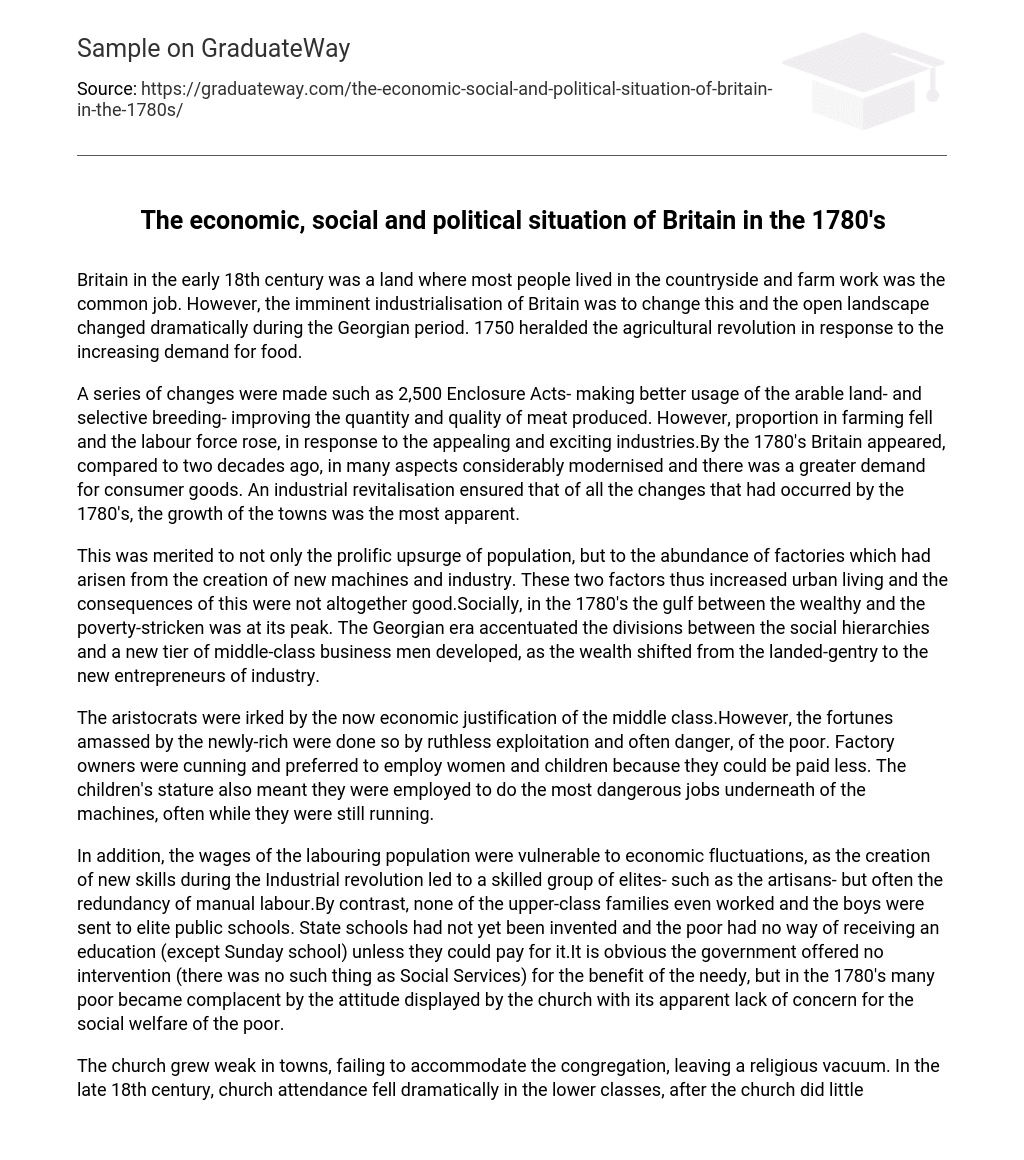Britain in the early 18th century was a land where most people lived in the countryside and farm work was the common job. However, the imminent industrialisation of Britain was to change this and the open landscape changed dramatically during the Georgian period. 1750 heralded the agricultural revolution in response to the increasing demand for food.
A series of changes were made such as 2,500 Enclosure Acts- making better usage of the arable land- and selective breeding- improving the quantity and quality of meat produced. However, proportion in farming fell and the labour force rose, in response to the appealing and exciting industries.By the 1780’s Britain appeared, compared to two decades ago, in many aspects considerably modernised and there was a greater demand for consumer goods. An industrial revitalisation ensured that of all the changes that had occurred by the 1780’s, the growth of the towns was the most apparent.
This was merited to not only the prolific upsurge of population, but to the abundance of factories which had arisen from the creation of new machines and industry. These two factors thus increased urban living and the consequences of this were not altogether good.Socially, in the 1780’s the gulf between the wealthy and the poverty-stricken was at its peak. The Georgian era accentuated the divisions between the social hierarchies and a new tier of middle-class business men developed, as the wealth shifted from the landed-gentry to the new entrepreneurs of industry.
The aristocrats were irked by the now economic justification of the middle class.However, the fortunes amassed by the newly-rich were done so by ruthless exploitation and often danger, of the poor. Factory owners were cunning and preferred to employ women and children because they could be paid less. The children’s stature also meant they were employed to do the most dangerous jobs underneath of the machines, often while they were still running.
In addition, the wages of the labouring population were vulnerable to economic fluctuations, as the creation of new skills during the Industrial revolution led to a skilled group of elites- such as the artisans- but often the redundancy of manual labour.By contrast, none of the upper-class families even worked and the boys were sent to elite public schools. State schools had not yet been invented and the poor had no way of receiving an education (except Sunday school) unless they could pay for it.It is obvious the government offered no intervention (there was no such thing as Social Services) for the benefit of the needy, but in the 1780’s many poor became complacent by the attitude displayed by the church with its apparent lack of concern for the social welfare of the poor.
The church grew weak in towns, failing to accommodate the congregation, leaving a religious vacuum. In the late 18th century, church attendance fell dramatically in the lower classes, after the church did little to alleviate the suffering of -one of the major bones of contention in Georgian time- slavery.The artist William Blake said he had “little time for the apathy of the church” and he regarded the industrial revolution with contempt; its “dark satanic mills, destroying England’s pleasant countryside and creating appalling living conditions.”The latter of Blake’s comment was certainly prominent.
As the new technology in both farming and industry signalled the move for most people away from the country to the towns, here marked the beginning of modern urbanisation. Towns could not cope with this sudden influx; poor sanitary conditions and the lack of clean drinking water caused frequent outbreaks of disease. Towns grew in a lackadaisical fashion, prestigious new developments often placed alongside slums, in filthy streets. Crime, industry and poverty had existed in pre-industrial Britain but because the population had been scattered over a wider are, these social problems had been less obvious.
There was a distinct lack of dignity and sense of dishonesty in this lacklustre new life; the novelist Tobias Smollet wrote in 1771:”The plough boys desert their villages and swarm up to London, in the hope of getting into service, where they can live in luxury. Great numbers of these fail to find jobs and become thieves and tricksters; and London being a great wilderness, in which there are few watchmen or police, they can find place to hide in and people to steal from.”The political state of the 1780’s was far from supportive to the poor, nor justifiable. The government elections too were warped, with the rule that only 40-shilling freeholds were entitled to vote so like all other aspects of British life, landowners manipulated Parliament; thus rewarding other landowners for their loyalty, without moral scruple.
There were only two parties in government, the Whigs and the Tories- effectively meaning the total absence of policies to help the poor- both parties were from the landed aristocrats and both vague in discipline and organisation.In conclusion, the situation of Britain in the 1780’s was somewhat in turmoil. From one angle it was a more economically-stable and modernised country. From the other, the towns were the epicentre of the social problems; the lower classes melancholic desperation exploited by the rich, and the politics of the country unable to effectively improve anything but the life of the already indulged landowners.
Said Benjamin Disraeli of Britain in the late 18th century; “There is no community spirit in England anymore… a large number of people in a small area means a harsh struggle for existence.”





